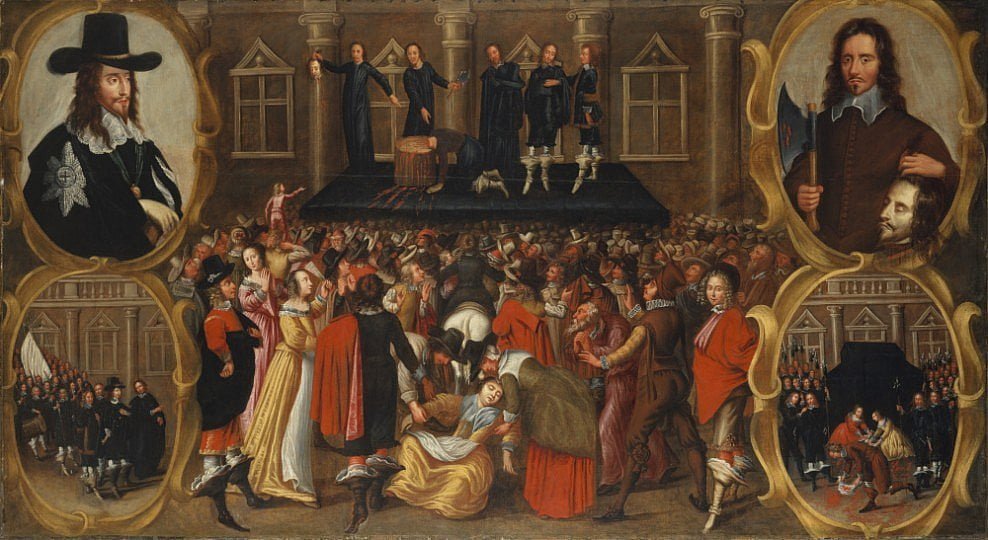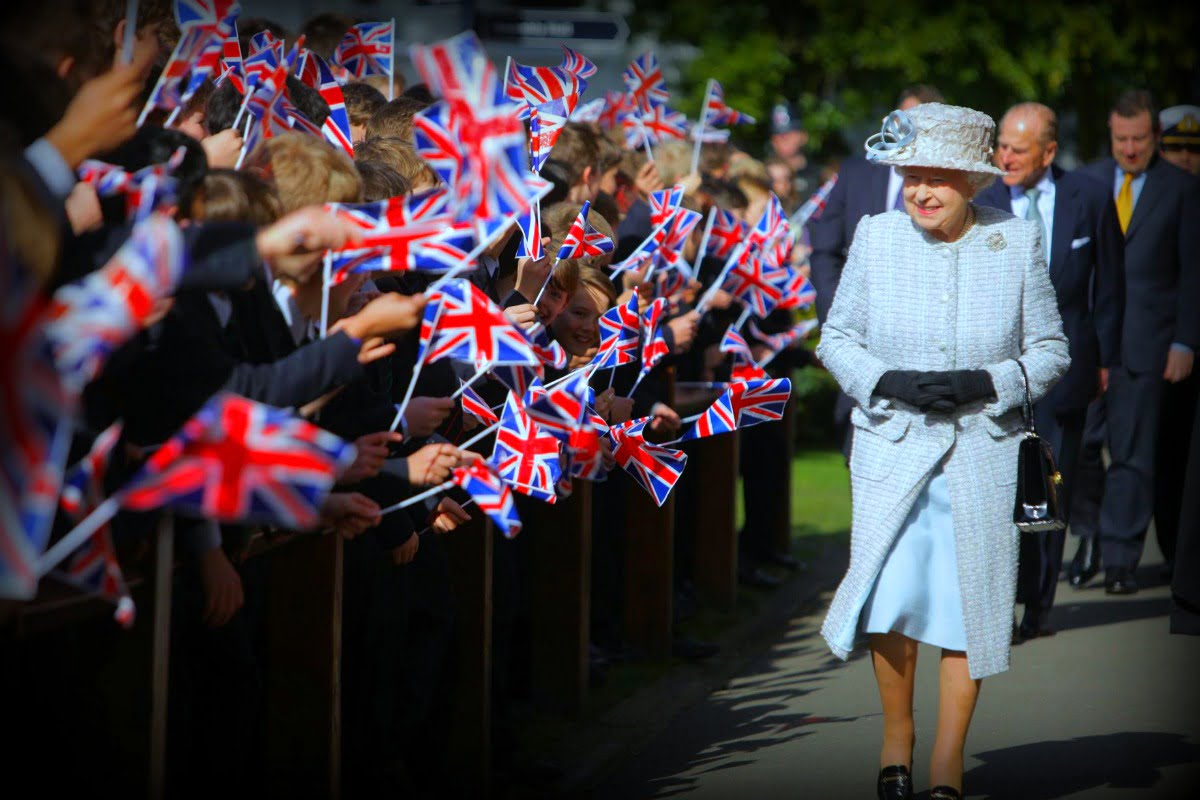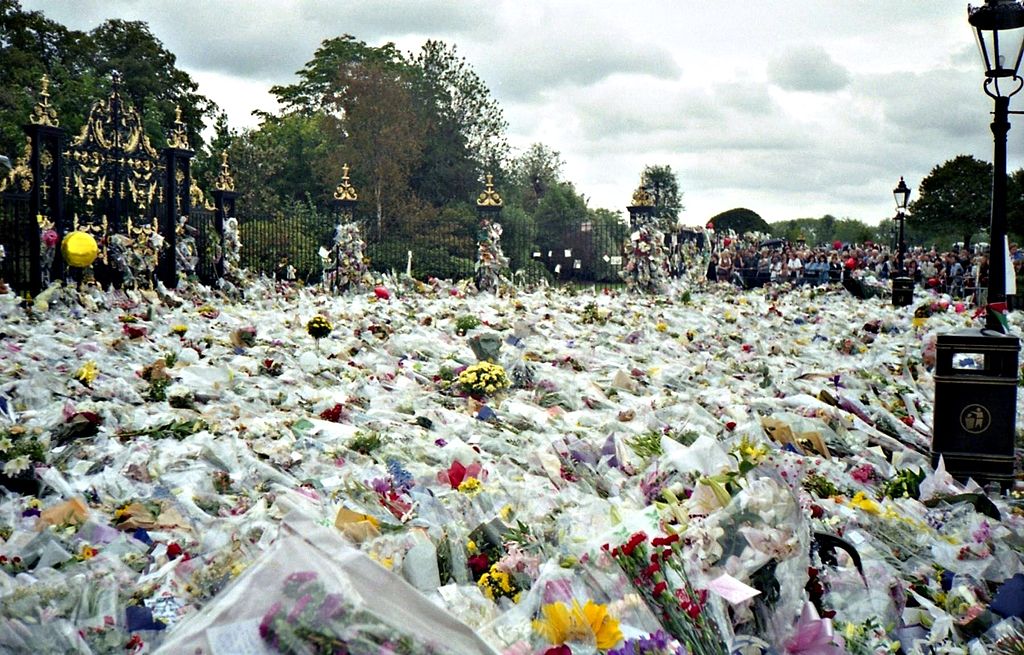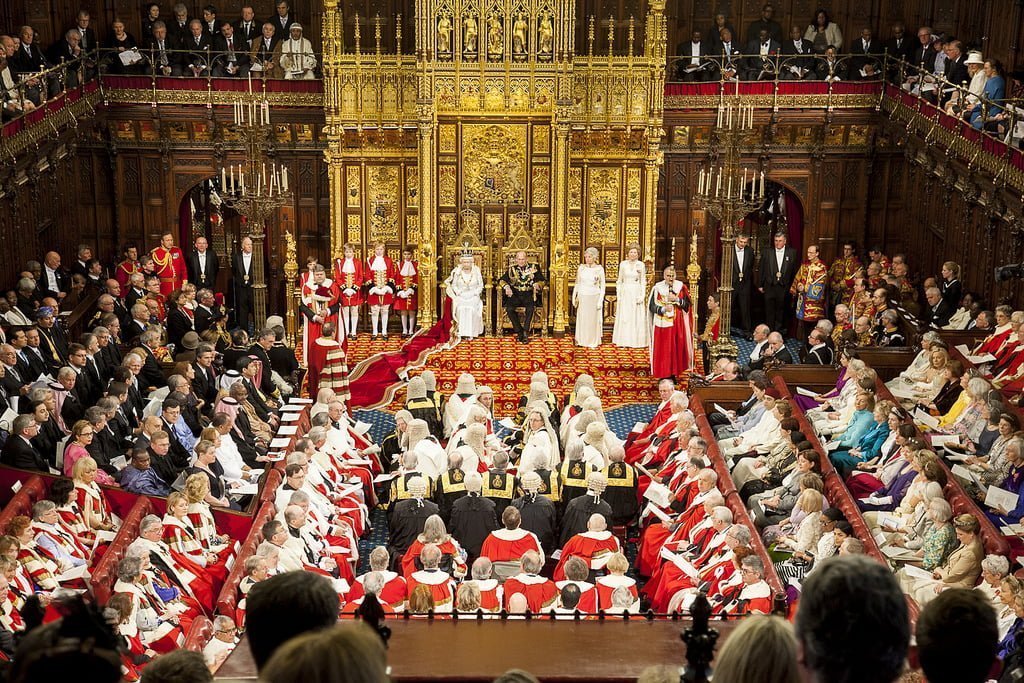Steve Jones examines the growing fears amongst the ruling class about what will happen when the reigning Monarch, Elizabeth Windsor, dies and the Crown is passed on to a successor. The Monarchy’s authority has been severely dented over the years, and this important pillar of the British Establishment is crumbling amidst the general crisis of capitalism.
A recent Guardian article about the almost-secret plans for what will happen when the reigning Monarch, Elizabeth Windsor, dies (she is in her nineties now) has revealed the incredibly elaborate – and eye-wateringly expensive – arrangements for what could be the biggest and longest funeral in British history.
Nearly two weeks of national mourning – dictated by volumes of protocols, micro-managing everything down to the last second – will engulf the nation. Nobody will be able to escape the ongoing saga.
Needless to say, like the recent decision to spend hundreds of millions of pounds on the planned upgrade to Buckingham Palace, there will be no austerity here in terms of state expenditure, as Royal shows are clearly deemed more important than say hospitals and schools or care homes and affordable housing.
How will all of this kick off once the Queen has drawn her last breath? The Guardian explains:
The last time a British monarch died, 65 years ago, the demise of George VI was conveyed in a code word, “Hyde Park Corner”, to Buckingham Palace, to prevent switchboard operators from finding out. For Elizabeth II, the plan for what happens next is known as “London Bridge”. The prime minister will be woken, if she is not already awake, and civil servants will say “London Bridge is down” on secure lines…
In the nine days that follow (in London Bridge planning documents, these are known as “D-day”, “D+1” and so on) there will be ritual proclamations, a four-nation tour by the new king, bowdlerised television programming, and a diplomatic assembling in London not seen since the death of Winston Churchill in 1965.
The next great rupture in Britain’s national life has, in fact, been planned to the minute. It involves matters of major public importance, will be paid for by us, and is definitely going to happen.
All the incredible pomp and circumstance that follows her death will seem to many like something out of a deleted scene from Downton Abbey gone mad. For example, according to the Guardian:
At dawn, the central window overlooking Friary Court, on the palace’s eastern front, will have been removed and the roof outside covered in red felt. After Charles has spoken, trumpeters from the Life Guards, wearing red plumes on their helmets, will step outside, give three blasts and the Garter King of Arms, a genealogist named Thomas Woodcock, will stand on the balcony and begin the ritual proclamations of King Charles III. “I will make the first one,” said Woodcock, whose official salary of £49.07 has not been raised since the 1830s.
The illusion presented will be one of ancient and historic rituals drawn (we are led to believe) from our dim and very distant past – the mythical ages of King Arthur, Robin Hood and the druids in Merrie England. “There is no concession to modernity in this,” one former palace official told the Guardian reporter.
In fact, all these rituals and ceremonies were invented in the early 20th Century by Edward VII, who seemingly had an interest in such things. Everything was just made up. Victoria had an obsession with her own death and laid out elaborate plans for her funeral. Before her, however, royal occasions tended to be haphazard and relatively disorganised. At one royal funeral the pallbearers were blind drunk. At another it was so cold the Bishop of London caught a chill and died. Now we will be in for a show. The Guardian continues:
One leading historian, who like most people I interviewed for this article declined to be named, stressed that the farewell for this country’s longest-serving monarch will be magnificent. “Oh, she will get everything,” he said. “We were all told that the funeral of Churchill was the requiem for Britain as a great power. But actually it will really be over when she goes.”
Here we see an indication of the underlying fear that haunts the Establishment over the passing of the crown from one generation to the next – “Quexit”, as it is being called. It reflects concerns over the changing role that the ruling class has carved out for the British monarchy, both over the last 150 years, but also over the last decade.
The changing role of the Monarchy
There was a time of course when the English king or queen actually did rule over us. Their word was law and they had the force (most of the time) to back it up. Monarchs either died of old age and illness, or got bumped off on the battlefield (if not murdered by their close and loving relatives). Invariably their lives were all about seeing off other claimants to the throne and making counter-claims to various bits of Europe in return.
Of course, this required the occupant on the throne to construct alliances and deals with at least some of the robber barons and lords that made up the upper-levels of feudal society. Magna Carta – usually presented as a document giving rights to the people – was in fact a document giving rights to a wealthy few at the very top of feudal England. As the Bard noted: uneasy lies the head that wears a crown.
The decline of feudalism in Britain and Europe took place over a period of hundreds of years, and its relics can be seen in society still today, starting with the Monarchy itself and the House of Lords. For a monarch in the Middle Ages and beyond, the task was to empty the pockets of the assorted barons and lords so that wars could be fought, palaces built and power extended. Naturally, the monarch was happy to hand over huge swathes of England in return for ensuring such loyalty, bearing in mind that there would always be a number of these nobles – feudal Blairites if you like – who had ambitions of becoming king themselves. Alternatively, an unfortunate lord could find himself having an extended stay in the Tower of London (or worse) if he put a foot wrong and ended up out of favour.
However, with the decline of feudal aristocratic wealth and power and the rise of the landowning and merchant gentry – the basis, together with the bankers and factory owners, of what would become the capitalist class – the position of the monarch became more uncertain. These new layers saw that their increasing importance within society was not being matched by political power. Instead, the monarchy –together with the church establishment and a ragbag of assorted (and in some cases quite impoverished) feudal princes, lords, etc. – maintained control through the Royal court. They always wanted money, but were disinclined to give anything in return.

The English Revolution
The outcome was inevitable: the English Revolution of the 17th Century and the execution of Charles 1st – the first English monarch to be removed in this way, by law rather than the rule of the sword.
Although the English monarchy was restored after the death of Oliver Cromwell, the die had been cast – the new balance of forces could not be undone. When the reigning king attempted to restore the privileges and power of the pre-1640 monarchy, he was summarily booted out and substituted in the form of William and Mary, brought in from Holland.
Historians refer to this as “The Glorious Revolution”, but it was in fact a coup. To be on the safe side, William brought along the full might of the Dutch navy to occupy London and ensure that the invite did not go sour. Nevertheless, he made clear to the assembled great and good that he accepted the new order of things.
The next century would see the powers of the monarchy gradually pushed back as the growing forces of capitalism sought to take political control of society – in their interests, of course, not ours. The landed aristocracy was overtaken by the landed gentry, who revolutionised farming methods with great brutality. They, in turn, would be supplanted by the industrialists, who would rip apart and rebuild towns and cities with the might of the Industrial Revolution, as well as consolidating and expanding the British Empire to raise trade and industrial production to previously unseen levels.
George III was the last king to attempt to exert real political power by means of his selection and control of ministers. After that, monarchs effectively reigned rather than ruled. Parliament was duly reformed in the early 19th century to remove the so-called rotten boroughs, by which established landowning families could have seats in the House of Commons without having to face any proper elections. This ‘reform’ was not intended to allow ordinary people to be elected, of course, but to allow city-based gentry and industrialists to have seats instead.
The People’s Parasites
Hard as it might be to believe now, the monarchy was often publically derided during the latter half of the 18th Century and into the 19th. With little work to do – no armies to lead into battle anymore – they were left to devote themselves to the hard task of drinking, eating and whoring. Royal courtesans were as well-known as pop stars are today. Huge sums were spent on vanity projects to boost egos. Newspapers and leaflets in turn routinely lampooned and attacked the actions of various members of the royal family without holding back.
When George IV died in 1830, Robert Huish’s biography of 1830-31 declared of the dead king that, “with a personal income exceeding the national revenue of a third-rate power, there appeared to be no limit to his desires, nor any restraint to his profusion”, and that he contributed more “to the demoralisation of society than any prince recorded in the pages of history”. Given the huge amount of drink, food and drugs consumed by George IV, first as Prince of Wales (or Prince of Whales as he was known) and then as king, Huish’s assessment was probably being kind. George IV’s reign of “great entertainment” was clearly out of step with the tone being set by the well-to-do post-Industrial Revolution ladies and gentlemen.
Marx spoke of the capitalists as having a personal austerity and protestant morality; the only task that mattered to them was the exploitation of the masses – now increasing herded into great cities and monstrous factories – and the accruing of capital to a degree never before seen in human history. Immorality and excess was to be avoided, in public at least.
So, a new and more “useful” role had to be found for the monarchy under capitalism. The illusionary propaganda of a happy (and model) Royal family that represents us all through the ages dates from around this time, from the reign of Victoria onwards. Real power would reside with the capitalist class through the organs of the State (their state now), although clear advantages were seen by the ruling elite in keeping the Monarch as titular Head of State, as we shall see.
The Monarchy was to be rebranded as an idealized image of a dull god-fearing middle-class Victorian family, albeit one with staggering amounts of wealth, palaces, land, and so on. Mistresses and drunkards were to be hidden away, and the Royals presented as sober upright actors in an Establishment play of morals. From now on it was to be all about service, as they like to put it.
Of course, the masses were still to be denied any real access to the Monarchy, so as to preserve the illusions and the mystery, if not the magic. Even today, few have ever heard the current Queen in normal conversation. Other Royals have had a go on television and radio at presenting themselves as normal chaps who you might meet in a pub or at a football match, but this has largely proved a failure – they simply are not up to it. The class divide is just too great.

“The wild waters are upon us now”
The Establishment deal was (and is) clear: do what we want, when we want it, and the State will ensure that you and all your cronies receive adequate (read: massive) funding in return. The current Monarch is now one of the richest women in Britain as a result. In effect, the British Royal family has been nationalised.
For over one hundred years the British Monarchy have stuck to the staid template outlined by the new ruling elite of the 19th century. However, things have become somewhat tricky in recent years – and are set to get a whole lot worse. After the death of Victoria, who like Elizabeth Windsor had the crown for a significant number of decades, the American author Henry James summed up the fears for the future when he wrote: “The wild waters are upon us now.” For the Establishment now considering “Quexit”, as they are with Brexit, the wild waters are again looming before them.
How can this be – and why, for the ruling class, does it matter?
To consider the first question, we need to look at how, beneath the façade, the position of the Royal family in society has been crumbling. Where once they were treated with fawning deference – as with the upper classes in general – by the masses, now they are increasingly being treated with indifference or even growing contempt. The current Monarch has been largely exempt from this critical mood by virtue of her great age, long reign and the fact that she never openly says anything controversial or of any substance at all. No doubt behind the scenes she is as reactionary as the rest of them, but she takes great steps to hide it.
The other Royals, however, are not treated as such. Complaints have been made about the lack of work being done by some of the Royal offspring (“the spares”) and their relatives. People joke about “Randy” Andy being on a “gap life”, and stories about dodgy business practices fill the tabloid press. The long held belief that the working class loves the Monarchy – aided by decades of dire British films about cheerful Cockneys and the like – has been found lacking. Indeed, it was always over-emphasised.
One indication of the changing mood was seen with the public reaction to the events following the death of the Queen Mother. As the Guardian reminds us, “In 2002, 130 people complained to the BBC about its insensitive coverage of the Queen Mother’s death; another 1,500 complained that Casualty was moved to BBC2.”
The Guardian writer continues:
At what point does the pomp of an imperial monarchy become ridiculous amid the circumstances of a diminished nation? “The worry,” a historian said, “is that it is just circus animals.”
Princess Diana
 It is this fear which now haunts the British Establishment. Perhaps the most severe and telling warning came with an event which even now must give Royal courtiers nightmares – the death of Princess Diana in 1997.
It is this fear which now haunts the British Establishment. Perhaps the most severe and telling warning came with an event which even now must give Royal courtiers nightmares – the death of Princess Diana in 1997.
Diana Spencer was a minor toff who was hurriedly married off to Charles Windsor so that he would be “proved” a man in their eyes and would quickly produce suitable Royal heirs of good stock, like breeders at a dog show. After several false alarms, Charles was under orders to get a move on and tie the knot with Diana. Needless to say, they were totally unsuited to each other – as they both realised even before the marriage day – and Diana the disco-dancing dimwit quickly started having a series of secret affairs (secret to the non-foreign newspapers in this pre-internet age, at least). After it turned out that Charles was also playing away, and after the unhappy couple had duly sired two sons, the marriage was ended in divorce and Diana downgraded to minor Royal status.
The Queen and her advisors seemed happy that the problem was now solved and that the troublesome Diana had been shifted off. Unfortunately for them, whilst she tended not to occupy the pages of The Times or The Racing Post, she was continuing to occupy the pages of a tabloid press who seemed obsessed with her. Although she came from wealthy bourgeois stock, people saw her as “one of us”, unlike the other tweed-wearing out-of-touch Royals with their horses and corgis. The Royal Establishment – “the firm” as they liked to call themselves – hated the fact that she showed affection to her children, unlike the rest of the Royals who tended to take coldness to extremes, even for the general standards of the upper classes with their nannies and boarding schools. In fact, far from being a model representation of the ideal family, the Royals appeared to many (rightly) as the most dysfunctional family in England.
In the summer of 1997 disaster struck and Diana was killed in a car crash in Paris, being chased in her limo by an army of press photographers. Britain seemed stunned. Special Sunday editions of the tabloids were printed with the latest news and sold at lunchtime to people trying to avoid the rain that had hit Britain in late summer.
The initial position of the monarchy was to follow strict protocol. Diana was a minor princess (and unpopular to many in the Royal household, including Elizabeth herself) and would be treated as such: no displays of grief; no flags at half-mast; no big funeral, and so on. All by the book.
Breaking protocol
Sitting in Balmoral, the Royals were oblivious to what was happening in London and other cities. Within days, the area around Buckingham Palace was full of flowers and other tributes. The mass media quickly went into state mourning mode, with all TV schedules ripped apart. Papers and magazines were filled with nothing else. Increasingly, words of criticism begun to be raised. Where was the Queen? Why were the Royal family not showing proper respect? Just who are these people to treat poor Diana as badly in death as in life?
The Financial Times of 6-7th September 1997 summed up what was happening:
“Her violent death in a car crash last Sunday morning has been followed by a demonstration of popular feeling so deep and broad as to have alarmed the institutions of the state. She has shown the power of the crowd.”
The FT continued:
“Anybody who has attended the vigils of these past days will have felt the palpable expression of a collective will. It is conveyed by the numberless tokens left at the gates of palaces and at the instant shrines that have sprung up all over the country: the messages, cards and photographs, teddy bears, painted portraits and flags; the queues of people waiting up to 12 hours to sign books of condolence; the banks of flowers lit by candles burning through the night.
“Neither the Palace, the politicians nor the press have been able to comprehend the phenomenon. In spite of the royal family’s own need for privacy the Queen was compelled to waive protocol, break with tradition, and make an exceptional broadcast to the nation last night. On Wednesday her prime minister was worried enough by the mood to defend the family against public criticism of its silence.
“Meanwhile, the press and television have been baffled by the strength of a popular feeling they did so much to stimulate. Commentators have found themselves trailing in the wake of ordinary people. They have struggled to make sense of the flood of human emotion as the collective mourning has progressed – like that of any bereaved individual – from shock and numb disbelief, to pain and confusion punctuated by anger or guilt, to sorrowful acceptance.”
Within days, the rulebook had been ripped up and Diana’s funeral turned into a full state event, to be screened live on TV. The Monarchy had been well and truly shaken and was now desperate to turn things around. However, it would get worse.

Establishment authority dented
On the day of the funeral, Britain shut down (although, being a Saturday, shops would re-open by the afternoon). Huge numbers stood outside Westminster Abbey, with an overflow event in nearby Hyde Park, complete with giant video screen. All seemed to be going well – and then Earl Spencer, Diana’s brother, spoke to the assembled congregation and directly seemed to attack those who had hated Diana; by implication, the Monarchy itself. The Observer report from the next day described what then happened:
“From within the Abbey it sounded like a shower of rain – a wave of applause that grew and grew. Then the congregation clapped too, even some of the journalists who had been the target of the Earl’s fury. The Royal Party sat in a pool of their own silence as the applause echoed around the Abbey…The institution’s gathering obsolescence has never been more cruelly exposed than over the last week; its hold on popular sentiment – crucial to its legitimacy – has been severely dented.”
The Establishment was severely shaken. From now on (albeit with varied success) the Monarchy would be obliged to try and prove their worth. Assorted Royals were quickly rebranded as charity workers and an assortment of events were laid on to try and re-enforce the Monarchy’s standing in society – such as the Queen’s Jubilee and the funeral of the Queen Mother.
The general feeling, however, is that this has not worked – the wild waters are still in sight. We all got a day-off for William and Kate’s marriage, yet the street parties – trying to recreate a wartime spirit – largely fell flat, and workers largely avoided filling the streets of London to watch the Royal procession, leaving that task to middle-class idiots and the huge numbers of tourists in the capital, pleased that they did not have to pay to see all this.
So the next and most crucial question must now be dealt with. Why does the standing of a bunch of wealthy hangovers from the Middle Ages actually matter to the ruling Establishment?
Unlike most of Europe, who either deposed their monarchy or left them as figureheads with no constitutional power, Britain has kept the old legal structure of a ruling monarch in place. In Britain, we have Her Majesty’s government, civil service, police and armed forces. At present they all swear allegiance to the Queen, not the people or the government. In practice we have a bourgeois parliamentary democracy, like France or Germany, but all UK laws nominally have to be approved by the Monarch. It is the Monarchy, in the form of the current Queen, who calls and dissolves parliament, summons governments and selects ministers. This is all just on paper of course, and advisers tell the reigning Monarch what to do. But what if it was no longer just on paper?
The reactionary role of the Monarchy
Capitalism accepts parliamentary democracy so long as it works for them. They are happy with this system because it gives the impression that we, the masses, are in control and running things. Of course, in reality, real powers lie with the rich.
The importantly question must be: what would happen if this system was no longer working as the Establishment required? Here they have – or, rather, thought they have – a ready-made get out. Under British law, the Monarch – duly advised – can indeed get rid of the government and dissolve parliament and legally rule by Royal decree, summoning a government and ministers of his or her own choice.
In 1931, the then king played a key role in convincing Ramsey MacDonald to dismiss the minority Labour government and establish a so-called “National government” instead. More recently, there was talk in high circles of a plot to remove the “untrustworthy” Labour government of Harold Wilson and replace it – by authority of the Queen – with a National government headed by the Earl of Mountbatten. It came to nothing; nevertheless, it shows that the Establishment was at least mindful of the reserve role which the British monarchy could play if needed.
Leon Trotsky explained the situation well:
“Royalty is weak as long as the bourgeois parliament is the instrument of bourgeois rule and as long as the bourgeoisie has no need of extra-parliamentary methods. But the bourgeoisie can if necessary use royalty as the focus of all extra-parliamentary, i.e. real forces directed against the working class.” (Trotsky’s Writings on Britain, Vol. 2, pp. 40-1.)
What was true in Trotsky’s time is doubly true today in this age of uncertainty and crisis. The nightmare for the Establishment is: would people accept this now, especially from those who will follow Elizabeth to the crown. What authority will King Charles and Queen Camilla have? On top of this, will Charles attempt to push forward some of his more crackpot (to the Establishment anyway) ideas when he wears the crown, as he has tried in the past?
The Monarchy represents one of the key pillars of capitalist society in Britain…but if that pillar is crumbling? This is the real “post-Quexit” dilemma that the Establishment must face. The Guardian article concludes:
“If the monarchy exists as theatre, then this doubt is the part of the drama. Can they still pull it off? Knowing everything that we know in 2017, how can it possibly hold that a single person might contain the soul of a nation? The point of the monarchy is not to answer such questions. It is to continue. “What a lot of our life we spend in acting,” the Queen Mother used to say.”
Ignoring the mystical rubbish about the “soul of a nation” then, the question is: can the Monarchy continue…and should it? If the Monarchy ceases to play any role anymore, then what about the rest of the edifice of bourgeois rule?
The Monarch and the rest of the Royals are no socialists. They would oppose any move towards the sort of society that we are fighting for. We should treat them likewise and understand what they would do faced with a revolutionary movement of the working class.
None of this feudal rubbish – the Monarchy, the House of Lords, etc. – should have any place in a socialist society. We are told that the Monarchy is good for tourism. Fine: open up the Royal palaces and grounds to the public! Members of the now-unemployed Royal family can give tours if they like and will be paid a proper salary, but no more. The unused parts of these buildings could be used to house the homeless. Most of all, the vast wealth held by these parasites could be redistributed for the good of all.
The privilege and inequality we see represented by the Monarchy is a reflection of the worst elements of class society. There can be only one response: it is time to draw a curtain on this Royal play.

Photos by (in order of appearance): UK Parliament (CC by-NC-2.0); Public domain; Wikimedia Commons/Auguel (CC by-SA 4.0); Wikimedia Commons/Maxwell Hamilton (CC by 2.0); Wikimedia Commons/Carfax2 (CC by-SA 3.0)






